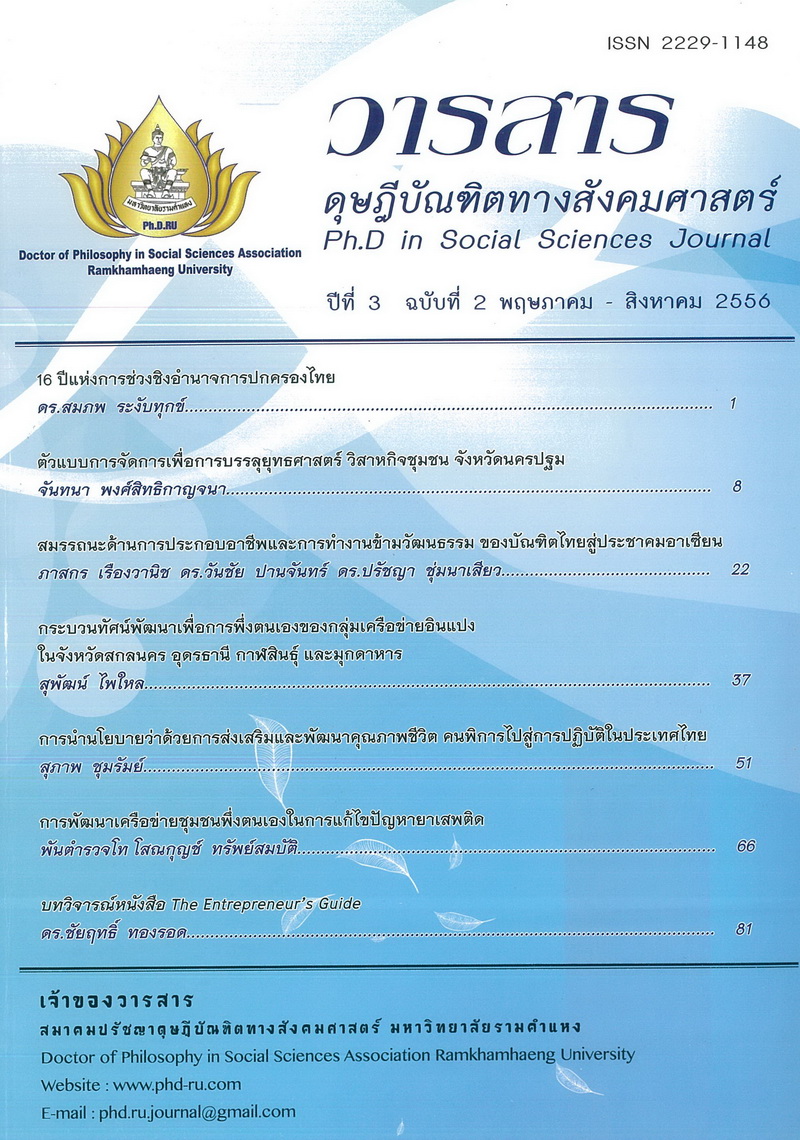การนำนโยบายว่าด้วยการส่งเสริมและพัฒนาคุณภาพชีวิตคนพิการไปสู่การปฏิบัติในประเทศไทย
Main Article Content
Abstract
Implementation of the Policy on the Promotion and Development of the Quality of Life of the Disabled in Thailand
The objective of this research is to study 1) the implementation process of the public policy to promote and develop the quality of life of the disabled in Thailand as carried out by the Ministry of Social Development and Human Security 2) various factors affecting the implementation process and 3) to propose suggestions and measures in order to achieve the goal. The findings are as follow 1.)The implementation process of the public policy concerning disabled persons (or persons with disabilities) has to follow specific bureaucratic procedures of the Royal Thai Government including those specifically of the Ministry of Social Development and Human Security. It has been found, however, that concrete support from the relevant “political” circle is of some importance, e.g. as regards amount of budget allocation and through the upgrading of certain personnel, particularly those involved directly in the implementation process, since higher rank means higher authority to get things done for the disabled 2.) The success in implementing the policy depends on the administrative skills as well as attentive dedication of various units of the official bureaucracy and those or groups of the private sector, particularly in various organizations of the disabled 3.) Bureaucratic mechanism puts much emphasis on hierarchical line of control and detailed regulations To follow strictly such rigid line and rules would naturally impede the policy implementation in the interest of the disabled. Thus certain conscientions officials to discreetly resort to alternative ways which work but to be sure, does not strictly follow the letters of officially prescribed procedures, albeit not glaringly illegal 4.)The implementation process is more than simplistically following written bureaucratic procedures. It has been found that due to limitations of resources, e.g. “Man, Money, and Material” the Management i.e. implementing officials, “street-level bureaucrats”, to use Pressman and Wildavsky’s key phrase, have at times to resort to their own particular way of adapting to the circumstances in order to come up with certain measures of success and report practical problems to the higher authorities for future remedial measures and 5.) Despite a variety of obstacles in the implementation efforts the outcome has been on the plus side, e.g. as regards higher percentages of those who officially registered as “disabled” or “persons with disabilities” which legally entitle them to be beneficiaries of the policy of the Royal Thai Government in allotting opportunities, things and services in fulfillment of the quality of life of those with different categories of disabilities, in urban or rural areas, male or female, young or elderly in significant number to be eligible for proper service toward their better standard of living.
Article Details
Academic articles, research articles, and book reviews in the Ph.D. in Social Sciences Journal are author’s opinions, and not the publisher’s, and is not the responsibility of the Ph.D. in Social Sciences Journal Philosophy Association, Ramkhamhaeng University. (In the case that research is done on human, the researcher has to be trained in Ethics for Doing Research on Human Training and has to produce the evidence of the training).


